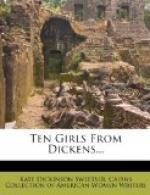“No, my dear, no, not an atom from anybody’s hand but mine, please. That dog,” said Jerry, pointing out the old leader of the troop, and speaking in a terrible voice, “lost a half-penny to-day. He goes without his supper.”
The unfortunate creature dropped upon his forelegs directly, wagged his tail, and looked imploringly at his master.
“You must be more careful, sir,” said Jerry, walking coolly to the chair where he had placed the organ, and setting the stop. “Come here. Now, sir, you play away at that while we have supper, and leave off if you dare.”
The dog immediately began to grind most mournful music. His master, having shown him the whip, called up the others, who, at his directions, formed in a row, standing upright as a file of soldiers.
“Now, gentlemen,” said Jerry, looking at them attentively, “the dog whose name is called, eats. Carlo!”
The lucky individual whose name was called, snapped up the morsel thrown towards him, but none of the others moved a muscle. Meanwhile the dog in disgrace ground hard at the organ, sometimes in quick time, sometimes in slow, but never leaving off for an instant. When the knives and forks rattled very much, or any of his fellows got an unusually large piece of fat, he accompanied the music with a short howl; but he immediately checked it on his master looking around, and applied himself with increased diligence to the Old Hundredth.
That night, from various conversations in which Codlin and Short took pains to engage her, little Nell began to have misgivings concerning their protestations of friendship, and to suspect their motives. These misgivings made the child anxious and uneasy, as the party travelled on towards the town where the races were to begin next day.
It was dark when they reached the town, and there all was tumult and confusion. The streets were filled with throngs of people, the church-bells rang out their noisy peals, and flags streamed from windows and house-tops, while shrill flageolets and deafening drums added to the uproar.
Through this delirious scene, the child, frightened and repelled by all she saw, led on her bewildered charge, clinging close to her conductor, and trembling lest she should be separated from him, and left to find her way alone. Quickening their steps they made for the racecourse, which was upon an open heath. There were many people here, none of the best-favored or best clad, busily erecting tents, but the child felt it an escape from the town, and drew her breath more freely. After a scanty supper, she and the old man lay down to rest in a corner of a tent, and slept, despite the busy preparations that were going on around them all night long.
And now they had come to the time when they must beg their bread. Soon after sunrise in the morning Nell stole out, and plucked a few wild roses and such humble flowers, to make into little nosegays and offer to the ladies in the carriages when the company arrived. Her thoughts were not idle while she was thus employed. When she returned and was seated beside the old man, tying her flowers together, while Codlin and Short lay dozing in another corner, she said in a low voice:




